- Home
- A. C. Crispin
Starbridge Page 2
Starbridge Read online
Page 2
"Why didn't you ask me?" Lamont growled.
Gable looked abashed, and very young. "I was afraid you'd say no," he admitted. "I'm sorry, sir."
"She'll have to go through quarantine when we reach Earth," Viorst warned him.
"I know. But six weeks won't be so terrible. Sekhmet's young, she'll adjust.
They'll let me visit her."
"Well, I guess it's all right," Raoul said, pouring himself another cup of coffee and clamping a lid over the steaming liquid. "But I'm going to have to fine you for disobeying orders, Doc."
"I figured you would," the younger man said resignedly, stroking the cat.
Sekhmet was asleep, relaxed trustingly into the hollow of his lap.
Raoul grunted and picked up his coffee. "Simon, we have work to do." He stood up, slanting a sardonic look down at Gable. "Doctor, you have until tomorrow to officially report for ship's duty. Welcome aboard Desiree."
"Thank you, sir."
With a brusque nod, Lamont left, Viorst close on his heels.
Mahree heard the doctor sigh with relief, then he softly addressed his cat. "I suppose that could have been worse, girl. At least he didn't chuck us out the airlock."
She glanced covertly at him again, only to find Gable regarding her curiously. Mahree blushed as she turned back to her history text. "Want a cup of coffee?" he called. "There's half a pot of this mud left."
"All right," she said, surprised, and moved over to take the mug he held out.
"Sit down," he said, waving her to the chair opposite him. "Here you go, Sekhmet"--he passed the cat to Mahree--"say
9
'thanks' to Ms. Burroughs for rescuing you." He shook his head, smiling. His easy, boyish grin revealed very white, even teeth. "If you hadn't shown such an attachment to her, your uncle might have insisted she go right back into hibernation."
Mahree smiled shyly as she took the cat and began rubbing her chin, eliciting another purr. "I doubt it. Uncle Raoul is too softhearted for his own good. He probably will 'forget' to collect that fine from you unless you remind him. He just puts on that official-sounding tone because he's afraid people won't respect him if they find out what a nice guy he is."
Gable took a sip of coffee. "I'm glad to hear that. On the way out from Earth I had a captain who was a real martinet--saluting, formal ship's uniform, all that rigamarole." He fell silent, watching her as she sweetened her coffee.
"You're what . . . sixteen? Seventeen? Stan told me, but I've forgotten. He talked about you all the time."
"I'm almost seventeen," Mahree said.
"Just my sister Linda's age," he told her. "She's the baby of the family."
"Do you have any brothers?"
He shook his head. "I'm the only male. Three sisters, all younger. You have a younger brother, right?"
"Stephen. He's twelve."
He grinned at her. "If memory serves, twelve-year-old boys are a real pain in the neck."
"Steve has his moments," Mahree said. "But he's not bad. He didn't have much opportunity to drive me crazy because I was away for two years, going to school on South Continent."
"During the Lotis Plague."
"Yes. First thing they did was quarantine North Continent, but then it spread down there anyway, during the second wave."
"The quarantine was only lifted a couple of months ago. You didn't have long to be home before leaving again."
"I was only there for six weeks before Desiree left. It wasn't long enough ..."
He didn't miss the faint tremor in her voice. "Homesick? Me, too. That's the real reason I couldn't leave Sekhmet behind--she reminded me too much of Nefertiti, the cat I had when I left home. She seemed like a link back to Earth."
"What did you do with her?"
10
"My mother's keeping her for me. I hope she's all right. I've been gone a lot longer than I'd planned."
Mahree heard the regret in his voice, and recalled that he'd traveled to Jolie from Earth to intern in colonial medicine. He'd landed during the early stages of the epidemic's first wave--¦ when the doctors were barely realizing that Lotis Fever had mutated into a planet-wide threat, no longer the flulike virus only dangerous to the very old and the very young.
She realized that her earlier awkwardness had vanished . . . she felt as though she'd talked with Robert Gable before, and often. "Well, if the Governor had given me Sekhmet, I wouldn't have been able to resist her, either," she said warmly. "She's beautiful, Dr. Gable."
He winced exaggeratedly, shaking his head. "Cal me Rob, please! 'Dr.
Gable' makes me think of my parents, not me."
"They're physicians?"
"Yeah . . . my father's a surgeon, my mother an abdominal specialist. They met over a patient during an emergency bowel re-section; isn't that romantic?"
Mahree giggled at the thought, then sobered. "Is that why you went into medicine?" She glanced down at the table and said, because she didn't want to betray her previous knowledge, "You seem awfully young to be a doctor.''
He shrugged. "I'm twenty-four. I kind of grew up with it, so it's not as impressive as it might seem at first glance."
Yeah, sure, Mahree thought dryly. My dad was plenty impressed, and he doesn't toss around words like "prodigy" and "brilliant" easily. "This is my first trip to Earth," she said.
He nodded. "I know. Your dad told me all about you and your brother. He talked about his family all the time. If I hadn't been so groggy from the hibernation, I'd have recognized you, from all the holos on his desk. Your father used to read me excerpts from your letters--I particularly liked the one about how you masterminded the scheme to switch the food-preparation programs so the faculty ended up with the students' dinner menu, and the kids got the teachers' liquor al owance."
"I got in a lot of trouble over that," Mahree said, ducking her head in embarrassment. "It was a pretty juvenile stunt. Dad didn't-think it was funny."
"Maybe he didn't admit his amusement to you," Rob told her, "but he went around the lab chuckling every time he
11
thought about it. Life was grim around there, and your letters were the only things that weren't depressing. At least . . . until the Plague hit your school.
Then it got rough, I know."
"It was better for me than for the others," she said, not meeting his eyes. "At least I stayed healthy."
"I don't know," he said grimly. "I think it's worse in some ways to be one of the ones who isn't sick. I remember that by the end of the epidemic, you wrote that you were pulling regular duty alongside the teachers and nurses."
Mahree nodded, then changed the subject. "My dad talked about you in his letters," she said. "He said he couldn't have completed his research on the L-16 without you."
"Bull. He'd have discovered it. Your father is a brilliant researcher, as well as an excellent physician."
"He's a great father, too. Even during the worst of the first wave, he still found time to call me once a week; usually from the lab."
"And now you're on your way to Earth for college?" Rob asked. "Where?"
"The Sorbonne in Paris."
He whistled admiringly. "Good school. What are you planning to major in?"
Mahree frowned as she stroked the cat. "I don't know. I don't seem to have much aptitude for the things I'm interested in, and the things I'm good at, I don't care about doing. I've even considered medicine, but ..." She shrugged.
"You ought to be sure before you spend four or five years of your life immersed in a subject," Rob warned. "It doesn't pay to pick something just because of your parents, because you want to make them proud, or admire the prestige and the money." He reached over to caress Sekhmet. Mahree saw that his hands were beautifully shaped--long-fingered and capable. His voice took on a bitter note. "I should know."
"You?" Mahree was startled. "But you're a doctor. My dad says you're very good! Don't you like it?"
He sighed. "Yes and no. The whole time I was growing up, it was all I
could imagine doing ... my parents were so thrilled when I was accepted at Johns Hopkins, because that was where they both went ..."
He took a sip of his coffee and made a face at the taste. "A lot of the time it's rewarding, but for some reason I've never
12
seemed to get everything I want out of it. I also got a Ph.D. in psychology, and sometimes I think that's more my line. But ..." He shrugged. "I don't know. I've always wanted to do something that would make a difference, that would be unique, that I could look back on at the end of my life and feel good about. Like your father, when he discovered the L-16 vaccine."
"I know what you mean," Mahree said eagerly. "I want to accomplish something special, too." Then her shoulders slumped. "But ... I don't know what that 'something' is."
Rob smiled wistfully, nodding. "I thought medicine would be my 'something special.' I thought that as a doctor I could really make a difference."
"But you did! During the epidemic, you and the others saved lots of lives."
"And lost nearly as many. Hundreds ... thousands of people died, and we were helpless to stop it." For a second the dark eyes in the unlined face were old, filled with pain. "I suppose I did make a difference, but ... every time I think about the people we saved, I remember all the ones we lost, so it doesn't feel right, if you can understand that." He sighed bitterly. "To me, it felt like failure." Rob shook his head, obviously frustrated. "I sound like some kind of glory hound, don't I? That's not the way I mean it."
Mahree cocked her head at him, forgetting her shyness as she considered his words. "I understand. Like me, you want a challenge. Something big. But at the same time you're afraid that even if it came along, you couldn't handle it."
His eyes met hers for a long moment, then he chuckled self-consciously.
"For two people who supposedly have most of our lives still in front of us, we're a gloomy pair, aren't we? And, as the person who supposedly keeps tabs on the mental health of everyone aboard, I'm hardly talking like a therapist. I'm supposed to make you feel better, not depress you."
"Then let's talk about something else," Mahree suggested. "Since Desiree is too small to need a full-time doctor or psychologist, you must have another shipboard job. What is it?"
"When Viorst goes into hibernation next week, I'll be in charge of the hydroponics," Rob replied. "Checking the greenhouse and the algae tanks to make sure the ship's oxygen supply stays constant."
13
"Can I help?" Mahree asked. "I had a garden back on Jolie."
"Sure." He grinned at her and lowered his voice confidentially. "The moment I met Simon Viorst I could just picture his hydroponics stock. Strictly by-the-book. Regulation algae strains, and maybe some neosoy."
"Yuck."
"Exactly. So, before we left Jolie, I stocked up on some seeds. By the time Viorst wakes up, we'll have a variety that'll make his eyes pop. Flowers for the tables in the galley. Fresh vegetables."
Mahree smiled back at him. "Tomatoes? Zucchini?"
He chuckled. "Of coursei They're the easiest of all."
"And if we don't eat all the zucchini"--Mahree began to giggle--"we can always implant them with transmitters and use them for space buoys."
The doctor shook his head ruefully. "Isn't it amazing that no matter how few you plant, you end up with a surplus?" Sekhmet mewed, butting her head against Rob's arm as she rose. After stretching herself to a seemingly impossible length, the cat jumped down and began cautiously exploring the galley. Mahree looked back at her companion. "What part of Earth are you from?"
"OldNorthAm, the Midwest. A place called Terre Haute."
"High Earth," Mahree translated, surprised. "That's French."
"You speak French?"
"That was my mother's first language. A lot of Jolie's colonists came from France. But tell me about Earth. What is it really like?"
"Well, when I left three years ago, it was about the same as it's been for the last two hundred years. Crowded. Even the colonies on New Am, Jolie, and Novaya Rossiya haven't taken the overpopulation pressure off, because most people won't travel fifty klicks to work, let alone fifty parsecs to have a better life. You were lucky to grow up on a colony world."
"Are the cities everywhere?" Dismayed, Mahree thought of her long walks over Jolie's fields, of the hikes and camping trips she had taken in the mountains. How could she give that up for years?
"No, not in OldNorthAm. The government owned a lot of the land, and they hung onto it until the bitter end. So there are still big wildlife refuges and parks, and there are several huge
14
areas belonging to the InterCouncil of Native American tribes. They call them living museums."
"Can anyone visit these places?"
"Well, they screen visitors pretty carefully, but I'm sure you could get in on a student pass. You enjoy hiking?"
"I love it."
"Sometime you'll have to catch the morning shuttle over and I'll take you out to the Blue Ridge Mountains, or the Rockies in Colorado. We'll take a picnic."
"That would be great! But I wouldn't want to ..." Mahree trailed off.
"Impose?" he guessed. "I remember vividly what it's like to be a stranger on a new world. Your father and mother made me feel as though I were a part of the family. It would be a pleasure to begin returning the favor. And I'd really enjoy hiking again."
She smiled. "Too bad we can't put on spacesuits and hike around the outside of the ship. We'll be closed in for--"
"Attention," interrupted the ship's intercom. "First Mate Joan Atwood report to the communications station immediately."
"Communications?" Rob frowned. "We're in metaspace, aren't we? Too far from Jolie to be receiving any messages?"
"I know." Mahree jumped up excitedly. "That was Uncle Raoul. He sounded funny. Something strange must be going on . . . maybe we've crossed the path of another freighter."
Rob shook his head. "The odds against that are--"
"Come on!" She headed for the door, waving impatiently for Rob to follow her.
Fortunately, the galley was located forward of the work areas and crew quarters, because even as Mahree bolted toward the bridge, she heard the excited babble of the other crew members behind her. She and Rob were at the forefront of a living wave as it spilled through the entrance into the control cabin.
All of the watch crew plus the Captain and the Chief Engineer stood clustered around the communications console located on the left side of the bridge. A quick glance at the viewscreens showed Mahree normal stars, instead of the flickering, elongated violet trails indicating passage through metaspace. That's strange, we're not due for a change of course, she thought, remembering that she had asked her aunt about it that morning over breakfast. Is something wrong?
15
But the navigation console and pilot's control bank looked normal--no telltales flashed red.
"What's going on?" she whispered, tugging on the nearest man's sleeve. He was dark-skinned and wore a baggy ship's jumpsuit with the green shoulder patch of maintenance engineering. His ID strip identified him as Azam Quitubi.
"Don't know," he said, in strongly accented Standard English. "I was giving a report to the Captain when the emergency- frequency signal went off. Jerry checked and said that it was a radio source, but that it didn't sound like an E-beacon to him. He was pretty excited."
"Excited? Jerry?"
Azam shrugged. Mahree craned her neck, trying to see the communications board. What's going on?
Travel between Earth and its three colony worlds was still minimal; five or six freighters and one or two passenger ships each year. Even though ships could move at faster-than-light speeds, using the Stellar Velocity Drive, no method of making FTL transmissions had yet been discovered, so Desiree and vessels like her transported messages and mail, in addition to freight and passengers.
Even though the chances of another ship happening by in time to assist in an emergency were practically zero, all vessels were e
quipped with emergency beacons, and, by law, all ships kept their E-frequency channels open at all times.
By now the entire nonhibernating crew had jammed into the back of the little cabin. Mahree couldn't hear over the babble, and she could barely breathe, sandwiched as she was between tal er people. Sweat trickled down the back of her neck. The ship's ventilation blowers were doing their best, but they weren't designed for such a concentrated crowd.
"Let me through, dammit!" Mahree heard her Aunt Joan bellow. "Raoul, I'm back here!"
"All right!" the Captain's voice roared suddenly. "I want all crew except myself, the Chief Engineer, the First Mate, and the Communications Chief to clear out! I'll let you know what's going on as soon as we know!"
Muttering reluctantly, the crowd shuffled backward, into the corridor. Joan Atwood finally emerged, a tall, raw-boned woman with pale, patrician features and a permanent frown line etched between her brows. Joan was an excellent pilot, hardworking
16
and unimaginative by nature, and coldly intolerant of stupidity or incompetence. She was stronger than most men, and had once fractured the skull of a crewman who had attempted to smuggle drugs aboard Disiree.
Mahree was a little afraid of her aunt.
As the crowd shuffled slowly out, Mahree stayed at the rear of the group. She paused within the entrance to glance back.
Joan Atwood was just seating herself at the communications console, beside Jerry Greendeer. The Communications Chief was a member of the OldNorthAm Winnebago tribe, and his features showed his ancestry clearly.
Like most crew members when on duty, he wore a ship's-issue, blue-gray coverall with Desiree's logo and his name above the breast pocket, but Greendeer had ripped the sleeves out and left the front fastening half-unsealed. Fetish necklaces of abalone shell swung against his broad chest, and turquoise studs winked from his earlobes between the lank strands of his shoulder-length black hair.
Still hesitating in the doorway, Mahree bit her lip, torn between obeying her uncle's orders and her overwhelming curiosity. Then she turned back into the control cabin. Since she wasn't crew, she decided not to move until specifically told to do so. Luckily, her uncle had already turned back toward the communications board and didn't notice her.

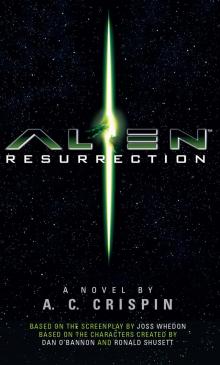 Alien Resurrection
Alien Resurrection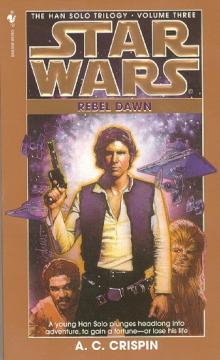 Star Wars - The Han Solo Trilogy - Rebel Dawn
Star Wars - The Han Solo Trilogy - Rebel Dawn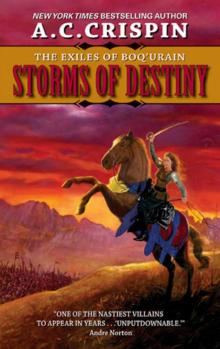 Storms of Destiny
Storms of Destiny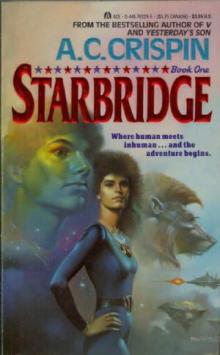 Starbridge
Starbridge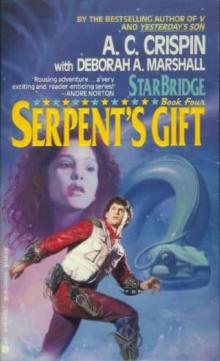 Serpent's Gift
Serpent's Gift Pirates of the Caribbean: The Price of Freedom
Pirates of the Caribbean: The Price of Freedom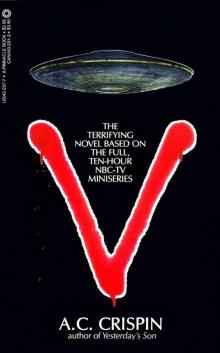 V01 - V
V01 - V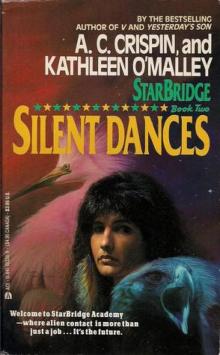 Silent Dances
Silent Dances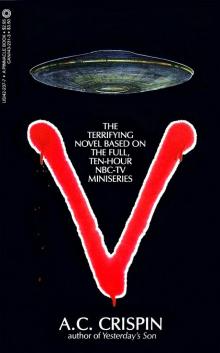 V
V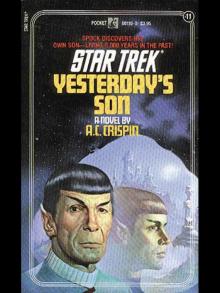 Yesterday's Son
Yesterday's Son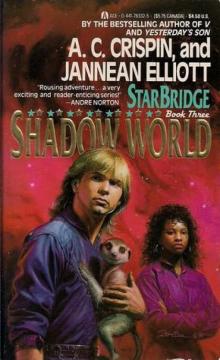 Shadow World
Shadow World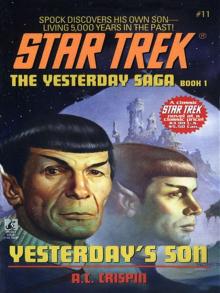 STAR TREK: TOS #11 - The Yesterday Saga I - Yesterday's Son
STAR TREK: TOS #11 - The Yesterday Saga I - Yesterday's Son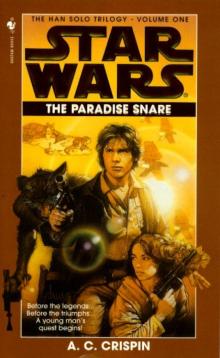 Star Wars - Han Solo Trilogy - The Paradise Snare
Star Wars - Han Solo Trilogy - The Paradise Snare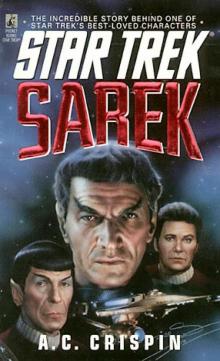 Star Trek - Sarek
Star Trek - Sarek Star Wars: The Han Solo Trilogy I: The Paradise Snare
Star Wars: The Han Solo Trilogy I: The Paradise Snare